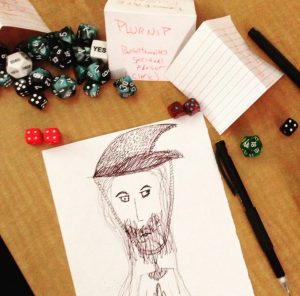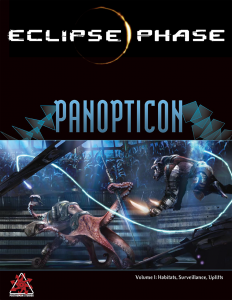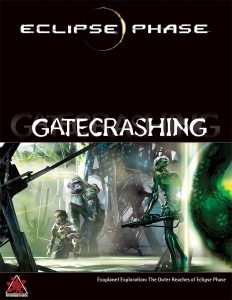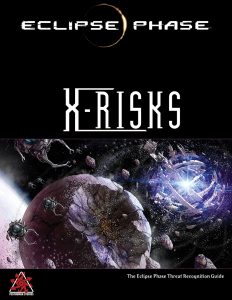



Previous
Next
What is a Tabletop Roleplaying Game (TTRPG)?
TTRPGs are an opportunity. An opportunity to create and connect. Most of the time with dear friends, some of the time with complete strangers. They allow us to tap into parts of our brains we don't always have the time to escape to when the real world is bearing down on us. Creative and bold tactics to solve fantastical problems, daring deeds that rely upon a tense roll of the dice, the joy of telling a story that no one else has told before...ever. Some of the biggest laughs I have had in my life have come at the table during a gaming session. And yeah...TTRPGs are also chips and drinks, delivery, late nights you wished would never end, leveling up, scoring loot, cursing dice, cheering even the smallest victories and forehead slapping when failure strikes at the most critical moment, but above all else, they are an opportunity to have some friggin' fun.
-Davidson
Derpity derp...
-Adam
Blah, blah, blah...
-Sprite
For the bone dry version, this is what Wikipedia has to say:
A tabletop role-playing game (typically abbreviated as TRPG or TTRPG), also known as a pen-and-paper role-playing game, is a form of role-playing game (RPG) in which the participants describe their characters' actions through speech. Participants determine the actions of their characters based on their characterization,[1] and the actions succeed or fail according to a set formal system of rules and guidelines. Within the rules, players have the freedom to improvise; their choices shape the direction and outcome of the game.[2]
Unlike other types of role-playing games, tabletop RPGs are often conducted like radio drama: only the spoken component of a role is acted. This acting is not always literal, and players do not always speak exclusively in-character. Instead, players act out their role by deciding and describing what actions their characters will take within the rules of the game.[3] In most games, a specially designated player typically called the game master (GM) creates a setting in which each player plays the role of a single character. The GM describes the game world and its inhabitants; the other players describe the intended actions of their characters, and the GM describes the outcomes. Some outcomes are determined by the game system, and some are chosen by the GM.[2] Specific tabletop RPGs may have a unique name for the GM role, such as Dungeon Master (DM) in Dungeons & Dragons, Referee in all Game Designers' Workshop games, or Storyteller for the Storytelling System.[citation needed]
The terms pen-and-paper and tabletop are generally only used to distinguish this format of RPG from other formats, since neither pen and paper nor a table are strictly necessary.
Snore...
Jack's Text:
What is a Tabletop Roleplaying Game?
If the world ended, and you were a survivor out in the cold vastness of space, who would you want with you? Your friends, right? Well, some of them. We suggest the ones you picked to be on your team when you replied to that zombie apocalypse survival group meme on social media. Bonus points if they also replied to that meme, and picked you. Grab those people, get some pop (or beer) and snacks, sit down around a comfortable table, and prepare to have some fun. Tabletop roleplaying games (henceforth, RPGs) are first and foremost a social activity. Put your phones in airplane mode, because you and your friends are going to tell reality to get lost for a few hours. If you could become anyone you wanted out there in space, who would you be? And how would you look? Tabletop RPGs are all about fantasy, and in this one, those fantasies can be pretty far out. Most of you are going to create a character, your alter ego in the game. While playing, you pretend to be this character, speaking in their voice and describing their actions. You might become an upgraded human, a bodiless artificial intelligence, or even a talking animal uplifted to human-level smarts. Your character might be a spy, a diplomat, a mercenary, a detective, an explorer, an activist, or maybe just an everyday person who’s in over their head. The game will guide you through creating a set of statistics, like a resumé for your character, so you’ll know what their strong and weak points are—their history, skills, desires, sanity, health, and reputation. When you daydream about the future, is it hopeful, fearful, or a bit of both? Do your friends see it the same, or differently? RPGs empower a group of people to share fantasies, hopes, and fears together. You’re going to find out who sees darkness, who sees light, who handles it with cynicism, and who handles it with humor. It can be illuminating—and intense. One of you will be the gamemaster (or GM, for short). The gamemaster describes what’s happening in the game world, plays the part of the people your characters meet, and sets up conflicts that your characters will have to overcome. If this were a video game, the gamemaster would be taking the part of the computer, responding to everything that the characters do. It’s a demanding job, but for the right person, it’s a hell of a creative outlet. For the rest of you, playing the game will be a lot like telling a story about something that happened to you once—only you’ll be telling a story about your character, and you’ll be making it all up as you go along. What would you do if 90% of humanity were dead or missing, but the survivors still couldn’t work together? RPGs are a way to explore dramatic situations, and the world of Eclipse Phase is full of them. Your gamemaster pal will use a scenario—either one published by Posthuman Studios, or one they wrote themself—to describe a tough situation in which your characters find themselves. They might have 24 hours to thwart the spread of a mutating alien virus, they might be tracking down agents of a crime syndicate that’s selling a weapon of mass destruction to the highest bidder, or they might have to survive being stranded on an alien world with hostile native life. The gamemaster describes the challenge to the players, and then it’s up to them to describe how their characters rise to meet it. Will you plan an intricate heist, go in with guns and hacking software blazing, or use persuasion and guile to talk your way through the situation? Often an RPG scenario calls for all of the above, making teamwork essential, because no character is good at everything. As you and your friends describe how your characters handle it, the gamemaster will describe the opposition. When the outcome is uncertain, you’ll roll dice and use your characters’ statistics to determine whether their plan works or not—and whether it costs them. What do you call a win in a world like this? Unlike most games, RPGs are cooperative, and there’s no winner or loser in the usual sense. You and your friends can play as the same group of characters for 4 hours or 4 years, and although the gamemaster does portray your opposition, they’re playing with you to make a cool story, not against you. Your characters might succeed or fail at the mission they undertake. But “winning” is more a matter of whether you’re enjoying playing your character, whether you’re interested in what’s going on in the game, and whether you’re having fun with your friends. Can a machine be a person? An intelligent animal? What about a copy of yourself, uploaded into the digital realm? Exploring strange and novel what-ifs is a huge part of the RPG tradition. Starting in the 1970s with fantasy worlds inspired by the likes of Tolkien, Fritz Leiber, and Ursula LeGuin, RPGs have explored everything from life as a cartoon character to unlife as a vampire. Eclipse Phase builds on this tradition with a set of what-ifs inspired by transhumanist science fiction. What happens when we modify ourselves beyond present human capacity? Should artificial intelligences and sapient animals be treated the same as humans? And if a backup of you could come back from the dead, would it be you, or just a copy? (And is that copy a person, too, even if they’re not really you?). Politics is a big part of the mix, as well. When you can 3D print just about any object you need without factories or a supply chain, is capitalism still relevant? Or do we need to move on to new socioeconomic models? Your characters and the scenarios they find themselves in will grapple with all of these questions. Extinction is coming. Will you fight it, profit from it, or ignore it? Every good RPG asks the big question: what separates the heroes and villains of a story from the characters who just show up and keep their heads down? Characters in Eclipse Phase have to make tough decisions, and sometimes the line between hero and villain blurs. But whether your alter ego chooses idealism or cynicism in their actions, they’ll always be making choices that separate them from the majority of people. You’re about to find out why millions of people have immersed themselves in RPGs over their 43 years of existence: it’s because those choices are yours and your friends’ to make. Win, lose, survive, or go extinct. It’s all down to you.
Ready to try it? You can download the Eclipse Phase quick start rules for free!
